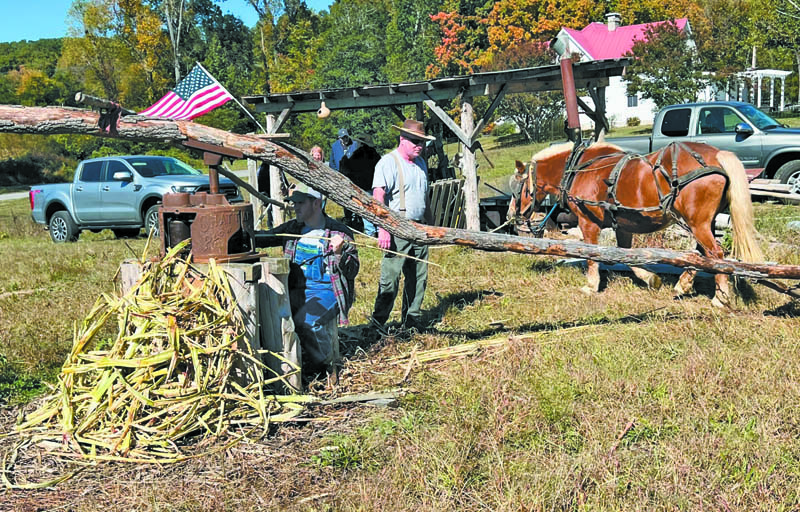Stooksbury’s farm adds Haflinger horse Ethel to grind sorghum cane

Haflinger draft horse Ethel turns the sorghum mill to grind the cane to produce sorghum syrup at the Stooksbury Sorghum mill in Andersonville on Saturday (Oct. 8). Bobby Stooksbury watches, while Kyle Buckner, Stooksbury’s nephew, feeds sorghum cane stalks into the mill. (photo:G. Chambers Williams III )
Joining Andy this season is the younger and smaller Ethel, a Haflinger draft horse whose lineage can be traced back to Austria and northern Italy.
Ethel came to Stooksbury’s Sorghum Mill at 514 Park Lane this year, and last weekend was her first time helping run the mill for the public – now that the sorghum cane is ready for syrup making.
According to Wikipedia, “the Haflinger is a breed of horse developed … during the late 19th century. Haflinger horses are relatively small, are always chestnut with flaxen mane and tail, have distinctive gaits described as energetic but smooth, and are well-muscled, yet elegant.”
Breeding stock still comes from Austria, and these horses are commonly used for draft and harness duties. They also are known for their endurance, and are “still used by the Austrian and German armies for work in rough terrain,” Wikipedia says.
At Stooksbury’s, Ethel will be taking turns with Andy to pull the mill that grinds up the sorghum stalks to extract the sweet juice that is cooked into sorghum syrup, also known as sorghum molasses.
Stooksbury uses the old techniques he’s learned and developed over 30 years of honing his craft.
The sorghum syrup he makes from the sorghum cane he grows on his farm has been an Appalachian tradition for centuries, and Stooksbury shows it off both at his farm and at the Museum of Appalachia on Andersonville Highway every fall.
He’s opened the operation on his farm to visitors every Saturday this fall, inviting people to watch one of the horses walk around in circles in the harness to power the cane mill, which grinds the stalks to extract the juice into a bucket underneath the mill.
That sorghum juice then goes to his nearby wood-fired cooker, where it’s slowly boiled down to make the syrup, which he bottles and sells for $10 a pint as “Gooseberry Hollow Sorghum Syrup.”
It takes about 10 gallons of the juice to make a gallon of the syrup.
The sorghum syrup differs from regular molasses in that it comes from sorghum cane, which grows easily in the Appalachian climate, Stooksbury said.
Regular molasses is a byproduct of making sugar, and comes from sugar cane, which does not grow in the cooler climate of Appalachia. It’s grown in more-temperate climates, such as from Louisiana down into the Caribbean area.
The sorghum syrup is great for biscuits and to sweeten cookies and other treats, Stooksbury said. At his farm, he sells the syrup along with soft sorghum cookies and barbecue sauce made by partner Alan Conrad.
“We make about 100 gallons of the sorghum syrup every year here on the farm,” Stooksbury said last Saturday afternoon as he stirred the boiling sweet product over the fire.
Nearby, Kyle Buckner was feeding cane stalks into the mill with Ethel walking around him in the harness. The horse walked slowly and softly to turn the mill, taking orders to start or stop from Buckner.
The syrup takes about three hours to make from the raw cane juice, and one acre of sorghum cane can make up to 150 gallons of the syrup, Stooksbury said.


